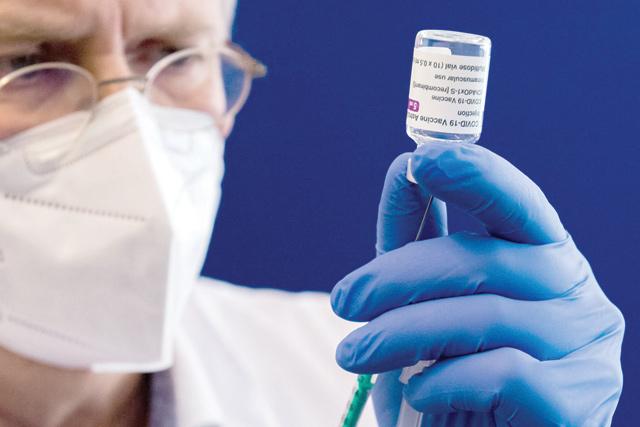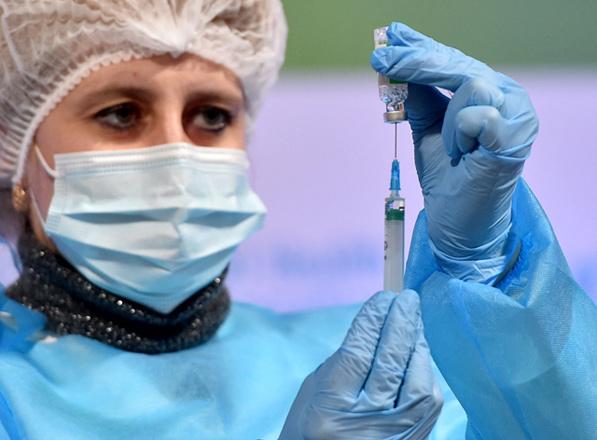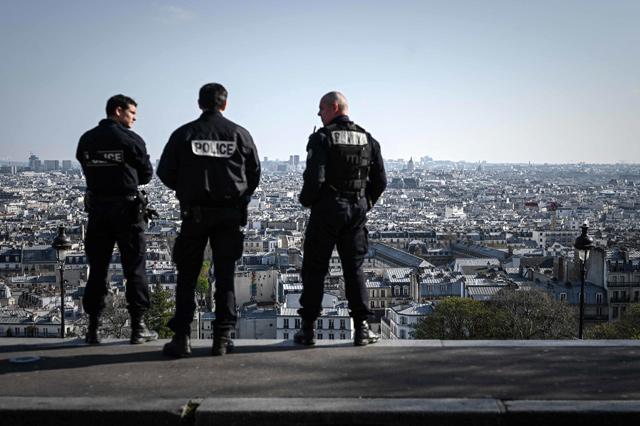You are here
More EU nations halt AstraZeneca jab over mounting clot fears
By AFP - Mar 16,2021 - Last updated at Mar 16,2021

In this file photo taken on February 12, a healthcare worker fills a syringe with the AstraZeneca COVID-19 vaccine at the university hospital in Halle/Saale, eastern Germany (AFP photo)
ROME — Germany, France and Italy on Monday joined a growing list of nations that have halted the AstraZeneca jab over blood clot fears, a blow to a global vaccine drive aimed at ending the pandemic.
The suspensions came as much of Italy went into lockdown again to stave off a dreaded third wave of the virus in one of the world's hardest hit countries.
Ireland and the Netherlands both halted the use of the jab over the weekend, and on Monday a Dutch drugs watchdog said there were potentially 10 cases of blood clots linked to the vaccine.
Germany, France and Italy followed suit Monday, despite still worrying levels of infections in all three countries.
French President Emmanuel Macron said he was awaiting guidance from the European Medicines Agency (EMA) about the use of the vaccine.
"The decision has been made... to suspend the use of the AstraZeneca vaccine as a precaution, hoping that we can resume it quickly if the judgement of the EMA allows it," he said.
AstraZeneca and the World Health Organisation (WHO) have both said the vaccine is safe for use and there is no reason to stop rolling it out.
The suspensions threaten to slow the progress of a global vaccine drive that experts say is the only way to overcome the pandemic that has already killed more than 2.6 million people around the world.
Indonesia on Monday also said it would delay the rollout of the jab, which is cheaper than its competitors and was billed as the vaccination of choice for many poorer nations.
But one of the vaccine's co-developers on Monday sought to quell anxieties over the inoculation, saying on balance there were greater risks in not getting vaccinated.
The director of the Oxford Vaccine Group, Andrew Pollard, said there was "very reassuring evidence that there is no increase in a blood clot phenomenon here in the UK, where most of the doses in Europe been given so far".
'Waste of money'
In Italy, any hope that the pandemic was reaching its endgame was dampened as schools, restaurants, shops and museums closed in several cities.
The streets of central Rome were quiet on Monday morning and businesses already battered by a year of anti-virus measures braced for another hit.
“I’m staying open because I’m selling cigarettes, otherwise it would not be worth it,” said Rome coffee shop owner Carlo Lucia. “It’s just a waste of money.”
Meanwhile, intensive care doctors in Germany issued an urgent appeal for new restrictions to avoid a third wave as the British variant takes hold there.
And while France was hoping to avoid another national lockdown, it was facing health and economic challenges — with Paris hospitals running out of intensive care beds and poverty and unemployment on the rise in cities such as Marseille.
“Often I don’t sleep at night, I wonder what will happen the next day,” 52-year-old Edith Ferrari, who struggles to survive between short-term contracts, told AFP.
“My hope in 2021 is to have a work contract but with COVID,” she added, her voice trailing off.
COVID origins report
More than 350 million vaccines have now been administered globally, with the AstraZeneca jab among just a handful approved for use around the world.
The European Union has approved four jabs so far, and is monitoring others — including Russia’s Sputnik V vaccine.
The Russian developers said on Monday they had reached production agreements in key European countries.
The news came as the WHO said it had raised nearly $250 million in the past year from regular people and companies towards battling the pandemic.
WHO chief Tedros Adhanom Ghebreyesus said the fund’s success proved “what we can accomplish together in times of need”.
More than a year after his organisation declared the coronavirus threat a pandemic, a much-anticipated report on the origins of COVID-19 is expected to be released this week.
The report follows a fact-finding mission of international experts assembled by the WHO, which travelled in January to the Chinese city of Wuhan where the virus first emerged in December 2019.
“Within the next few years, we’re going to have real significant data on where this came from and how it emerged,” said British zoologist Peter Daszak, one of the team members.
Related Articles
GENEVA — The EU's medicines regulator said onTuesday there was so far "no indication" the AstraZeneca vaccine causes blood clots, urging cou
LONDON — Queen Elizabeth II’s oldest son and heir on Wednesday criticised opposition to coronavirus vaccines, as British ministers sought to
PARIS/LONDON — France, Poland and Ukraine introduced new lockdown measures Saturday to fight a surge in coronavirus infections, as the Europ


















